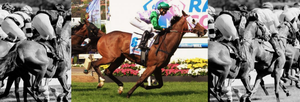Women were excluded from professional horse racing until the 1970s, but a new generation of female apprentice jockeys are now overtaking their male colleagues.
Jamie Melham made history this year as the first female jockey to win both the Melbourne Cup and Caulfield Cup, on the back of the horse Half Yours.
Ten years on from Michelle Payne's win on Prince of Penzance, she and Melham are the only women to win the Melbourne Cup since it began in 1861.
These startling facts are not indicative of women's long and complex involvement in the Australian horse racing industry, but they do mark the beginning of a new era for female jockeys in Australian racing.
Who is Jamie Melham?
Born in 1995 to two Olympic speed skaters, Melham grew up in Mount Pleasant in South Australia.
She began riding lessons and pony camp at Kersbrook Equestrian Centre, near where her family lived, when she was 8. Then she left school at 15 to begin her apprenticeship as a jockey, and competed in her first race in March that year.
In 2021, she became the first jockey to ride 100 winners in a Melbourne Metropolitan racing season. That same year, Melham was named the leading female jockey in the world by Thoroughbred Racing Commentary global rankings.
So her historic 2025 wins in the Caulfield Cup and Melbourne Cup may not be entirely surprising.
When did women begin racing in the Melbourne Cup?
Women were formally excluded from professional horse racing in Australia until the 1970s.
Despite working as stablehands, track riders and trainers, female riders were long deemed unsuitable for the physical and competitive demands of the sport.
That changed thanks to the Lady Jockey's Association lobbying for years to allow women fifteen races per year on country Victorian racetracks.
By 1979, women could finally apply for professional jockey licences in all states and territories. This paved the way for a new generation of riders to compete at the highest levels.
It still took eight years for the first woman to compete in the race that stops a nation.
In 1987, New Zealand citizen Maree Lyndon became the first woman to race in the Melbourne Cup on Argonaut Style. Though she finished unplaced, the ride was a significant symbolic breakthrough for women in the racing industry.
Then, in 2003, the first Australian female jockey, Claire Lindop, riding on Debben, lined up. Despite being unplaced, she's recognised as a trailblazer for Australian female jockeys.
What prevents women from joining the racing industry?
Barriers to women’s full participation in racing persist, despite their growing visibility and success.
The sport’s deep-rooted masculine history continues to shape who gets opportunities and who gets scratched.
A 2017 study by the UK's Oxford Brookes University on women’s representation and diversity in the horse racing industry found that many female jockeys report limited access to quality rides, unequal prize money distribution, and resistance from some trainers and owners who still favour male riders.
After winning the Melbourne Cup in 2015, Payne said, "Everyone else can get stuffed [who] think women aren’t good enough. It’s such a chauvinistic sport, a lot of the owners wanted to kick me off."
Will we see more women racing?
Times are changing. In 2025, female apprentice jockeys are undeniably outnumbering their male counterparts.
In Victoria , 83 per cent of apprentices are women, while the figure sits at 80 per cent in Queensland and 72 per cent in New South Wales according to a report published by the ABC.
A generational shift is also underway as racing schools and industry programs have begun supporting and recruiting women. This includes the introduction of the Magic Millions Racing Women’s Initiative.
The success of women like Payne and Melham is also inspiring a new wave of young female riders.
One of these is Brisbane's Angela Jones. In July, the 24-year-old became the first woman to win the Brisbane metro jockeys' premiership. And, according to Racing Queensland, seven of the this season's top 20 jockeys in the Brisbane city title are women.
So while it will take time for this new group to reach elite competitions like the Melbourne Cup, the next decade could see more women than ever at the highest levels of racing.
Related stories
Arabella is studying a Bachelor of Media with a major in Communications and Journalism, and a minor in Australian Studies at UNSW.
